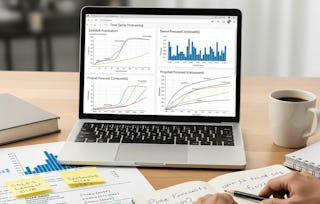This course is the second in a specialization for Machine Learning for Supply Chain Fundamentals. In this course, we explore all aspects of time series, especially for demand prediction. We'll start by gaining a foothold in the basic concepts surrounding time series, including stationarity, trend (drift), cyclicality, and seasonality. Then, we'll spend some time analyzing correlation methods in relation to time series (autocorrelation). In the 2nd half of the course, we'll focus on methods for demand prediction using time series, such as autoregressive models. Finally, we'll conclude with a project, predicting demand using ARIMA models in Python.

Demand Forecasting Using Time Series
Seize the savings! Get 40% off 3 months of Coursera Plus and full access to thousands of courses.

Demand Forecasting Using Time Series
This course is part of Machine Learning for Supply Chains Specialization

Instructor: LearnQuest Network
4,174 already enrolled
Included with
39 reviews
Recommended experience
What you'll learn
Building ARIMA models in Python to make demand predictions
Developing the framework for more advanced neural netowrks (such as LSTMs) by understanding autocorrelation and autoregressive models.
Skills you'll gain
Tools you'll learn
Details to know

Add to your LinkedIn profile
5 assignments
See how employees at top companies are mastering in-demand skills

Build your subject-matter expertise
- Learn new concepts from industry experts
- Gain a foundational understanding of a subject or tool
- Develop job-relevant skills with hands-on projects
- Earn a shareable career certificate

There are 4 modules in this course
Earn a career certificate
Add this credential to your LinkedIn profile, resume, or CV. Share it on social media and in your performance review.
Instructor

Offered by
Explore more from Machine Learning
 Status: Free Trial
Status: Free Trial Status: Free Trial
Status: Free Trial Status: Free Trial
Status: Free Trial Status: Preview
Status: Preview
Why people choose Coursera for their career

Felipe M.

Jennifer J.

Larry W.

Chaitanya A.

Open new doors with Coursera Plus
Unlimited access to 10,000+ world-class courses, hands-on projects, and job-ready certificate programs - all included in your subscription
Advance your career with an online degree
Earn a degree from world-class universities - 100% online
Join over 3,400 global companies that choose Coursera for Business
Upskill your employees to excel in the digital economy

